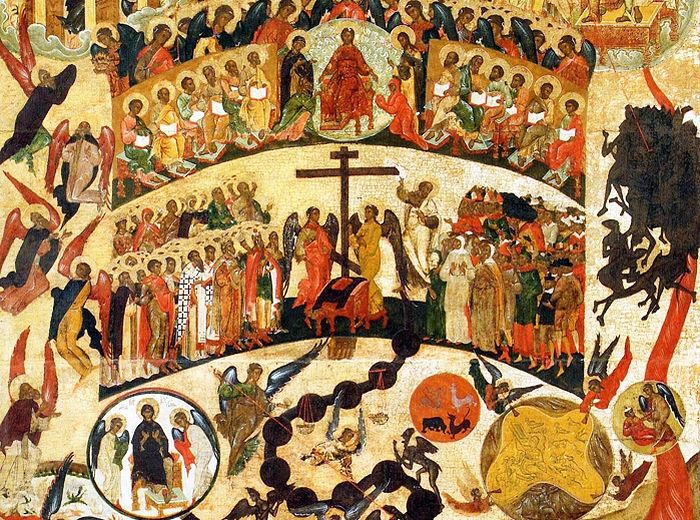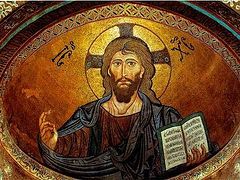Just what the Last Judgment is, every person knows to some extent—even if he has not read the Gospels or heard a Christian sermon; even if he has no faith at all. He knows because every person has a conscience. Even before the books of judgment are opened and the Impartial Judge pronounces His sentence about our eternal lot, even in this earthly life, the stern voice of conscience will condemn us. Just like the Heavenly Judge, this accuser is just and incorruptible, because the conscience is Vox Dei, the voice of God in man. It performs the small rehearsal of the Last Day of the Lord, evoking a nagging feeling of guilt and shame before the final judgment of our iniquity.
But of course, our earthy existence leaves us the right not to obey this testimony and do whatever we want; but the inner voice of conscience will nevertheless continue to reproach us to the end of our days, reminding us of our wrongdoing. The apostle Paul wrote about this in his epistle to the Romans. Talking about the pagans, Paul notes, Which shew the work of the law written in their hearts, their conscience also bearing witness, and their thoughts the mean while accusing or else excusing one another (Rom. 2:15). Of course, this relates to Christians just as much as it does to pagans, because the law of grace does not invalidate the law of conscience.
* * *
The apostolic words allow us to imagine an interesting picture. On people’s hearts as on a kind of scroll is written the divine law of conscience, which raises its voice independent of our wishes. Furthermore, in the soul of every person both believing and non-believing a certain inner parliament is constantly in session. Besides the voice of conscience, other speeches and proclamations are heard—our desires, feelings, mind, and will. The speakers take their turns, various “legislative projects” are discussed, and resolutions are passed. The voice of conscience can be compared to the speech of the supreme ruler—the president. His opinion has the advantage over the noisy meeting. But there is an opposition party that speaks in counterweight to the president, in which one can discern the whispering of the enemy of mankind. It is his ancient occupation to place the president’s orders under doubt.
The final verdict remains to be voted upon. Here more important is the personality of the person who is weighing pro et contra. St. Theophan the Recluse says about this, “Who is the decider? The free personality of the acting individual. And no one can decide why this person is inclined toward one or another side, and his decisions cannot be fitted into any laws that would make these decisions predictable.”1 Thus, a person makes his own decision, and the session closes—so that the next one can open.
This inner parliament will be working at the Last Judgment also. True, the discussions and resolutions will be about not today’s but past deeds will have the aim of evaluating them spiritually and morally. To this conclusion leads the continuing speech of St. Paul: Which shew the work of the law written in their hearts, their conscience also bearing witness, and their thoughts the mean while accusing or else excusing one another; In the day when God shall judge the secrets of men by Jesus Christ according to my gospel (Rom. 2:15-16).
How interesting that St. Paul relates all of this inner mental council to the Last Judgment. It turns out that on that day, the parliament of our heart will take upon itself a judicial function, and even before God’s sentence the person will be judged by his own conscience. In the present life this council can make mistakes in its decisions or avoid the pangs of conscience. But on that day, the judicial process will be overseen by the all-seeing eye of God, and there will be no mistakes. Our own judicial parliament (fulfilling a judicial function and headed by Christ) will accept an honest and final decision regarding us.
The holy fathers confirm and elaborate upon the apostle’s thought. In the words of St. John Chrysostom, “On the day of judgment our own thoughts will take the stand, now condemning, now justifying, and the person at that judgment seat will have no need of any other accuser.”2 St. Basil the Great ponders it in the same way. In his opinion, the Last Judgment will be more of an inner event than an outward order—it will take place in the person’s conscience, memory, and mind. Moreover the judgment will happen with lightning speed: “Probably through some unspeakable power, in a flash of time, all the deeds of our life will be imprinted in the memory of our soul as in a picture.”3 “There is no need to think that much time will be spent as everyone looks at their deeds; both the Judge and the findings of God’s judgment will with unspeakable power and in a moment of time appear before the mind, and all will be vividly depicted before us; and in the realm of the soul, just as in a mirror, each will see the image of what he has done.”4
Such a picture of the Last Judgment somewhat breaks the usual stereotypes, isn’t it true? As it turns out, no one is going to be dragged anywhere like a caught thief. Before God’s sentence each person will catch himself and find himself in his own hell. I don’t know what others may think, but for me this inner judgment seems much more terrible than the torments of sinners on a Bosch canvas. When it’s all clear to you yourself, when you understand that your whole life was wrong and there is no second chance, and your conscience burns inside with an unbearable fire—that is the most horrible hell. Hell is too late, said Dostoevsky, and this “too late” taken together with the torments of conscience is truly more terrible than both Dante’s hell and the fantasy of the ingenious Hieronymus.
This is why we call it the Dread Judgment, although there is no such phrase in the Bible. In general a Christian should expect the Judgment Day with joy and hope. We should pronounce along with the Armenian poet Gregory Narekatsi:
I know the day of Judgment is near,
And we’ll be accused of quite a lot,
But isn’t God’s judgment still a meeting with God?
Where will the Judgment be? I’m going there!5
But sins worry us, and we have little faith; and the fear of punishment weighs us down. And our conscience—the one that is already empowered to judge—suggests to us the lines of the Church prayer: “When I remember the day and hour of Thy terrible, threatening, and incorruptible judgment, O Christ, I tremble for I do wrong, my deeds are shameful and evil, for which I alone am to blame.”6
And after these words of the Church we would like to pronounce our own, simple words: O Lord accept us who repent, have mercy on us, who do not know how to rejoice in Thee. Allow us to meet Thy coming with repentance. We believe that Thou wilt not turn us away, but will accept us and forgive us—because the One Who said, repent ye, and believe the gospel (Mk. 1:15) will never reject faith and repentance.
* * *
Thus, the apostle Paul, and after him the holy fathers say that God’s judgment will be preceded by the indisputable testimony of the human conscience. No one can challenge the Judge’s final pronouncement on man’s final lot, for the conscience of the one accused will confirm the sentence. We already know by experience something akin to the Last Judgment in this life, when our conscience judges our thoughts, words, and deeds. Only on that dread day the voice of conscience will be like a bared sharp sword. For now this sword is covered with the rust of our cunning and self-deceit, but on the day of the Lord all rust will vanish, and the sharpened blade of conscience—God’s voice in man—will separate righteousness from iniquity and distinctly determine our eternal lot. And this is worth thinking about and worrying over.




